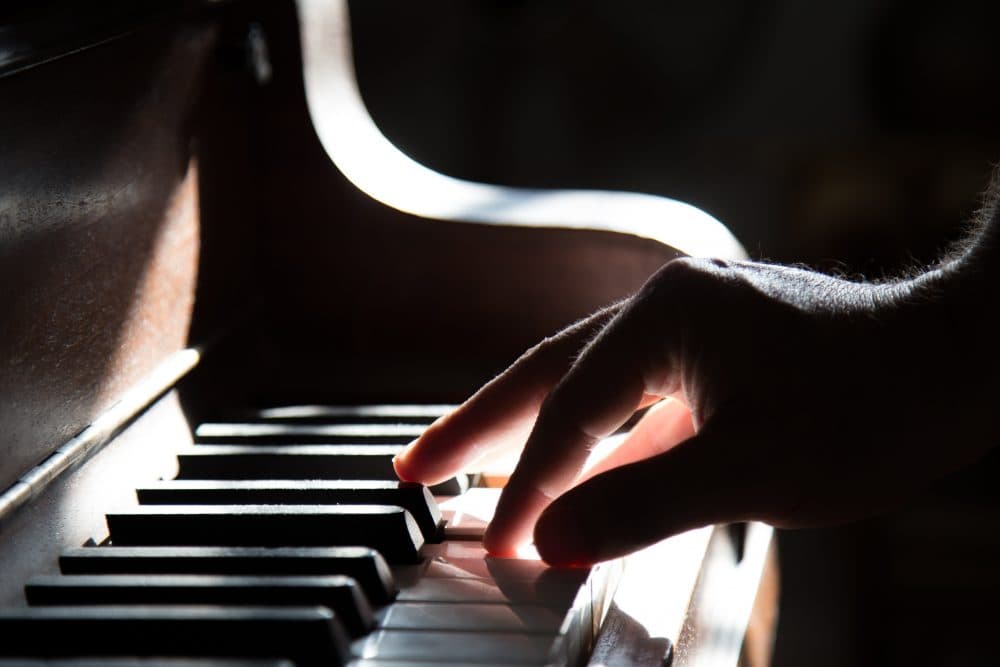Advertisement
'Every Note Played' Traces ALS Through A Concert Pianist's Eyes

The new book "Every Note Played" tells the fictional story of a concert pianist whose career comes to an abrupt end when he is diagnosed with the degenerative disease ALS.
Here & Now's Lisa Mullins speaks with author Lisa Genova (@LisaGenova).
Book Excerpt: 'Every Note Played'
By Lisa Genova
Richard sits down at his piano for the first time in three weeks, since August 17, the day his right index finger gave up the fight, the last of his right-handed fingers to fall deaf to his wishes. He’d been testing it daily. On August 16, he could tap his right index finger ever so slightly. He clung to this accomplishment, pathetically celebrating this movement that required massive mental and physical effort and that looked more like a feeble tremor than a tap. He placed his entire life’s hope on that finger, which eight months ago could dance across the keys of the most complex, athletic pieces without missing a beat, striking each note with just the right amount of force.
FORTISSIMO!
Diminuendo.
His index finger, every finger of his right hand, a finely calibrated instrument. If he made a single mistake while rehearsing, if one of his fingers lacked confidence, strength, or memory and stumbled, he’d stop instantly and start the piece over from the beginning. There was never room for error. No excuse for his fingers.
Advertisement
Eight months ago, his right hand held five of the finest fingers in the world. Today, his entire right arm and hand are paralyzed. Dead to him, as if they already belong to a corpse.
He picks up his lifeless hand with his left and places it on the keys, setting his right thumb onto middle C, pinkie on G. He feels the cool sleekness of the keys, and the touch is sensual, seductive. The keys want to be caressed, the relationship ready and available to him, but he can’t respond, and this is suddenly the cruelest moment of his life.
He stares in horror at his dead hand on the beautiful keys. It’s not simply that his hand is motionless that makes it appear dead. There’s no curl to his fingers. His entire hand is too straight, too flat, devoid of tone, personality, possibility. It’s atrophied, flaccid, impotent. It appears fake, like a Halloween costume, a Hollywood prop, a wax prosthetic. It can’t belong to him.
The air in the room thickens, too solid to breathe, and he can’t seem to remember how to inhale. A wave of panic slips through him. He places his left fingers on the keys, arm extended, wrist up, fingers curled, loving the keys they touch, and he inhales sharply. He heaves air through his lungs as if running for his life while his desperate eyes search the keys and his two hands for what to do. What the hell can he do?
He begins to play Brahms I, actual notes with only his left hand, the right-hand notes with his mind’s ear. He played this fifty-minute concerto with the Boston Symphony Orchestra at Tanglewood last summer. Eighty-seven pages memorized and played as near to perfection as anyone ever has. Some nights the music is well played and applauded, and other nights, the music is transcendent. He lives for those transcendent nights.
That evening on the lawn, the entire orchestra was more than simply a cover band for Brahms. They were an open conduit, breathing life into the music, and he felt that ecstatic, energetic connection between his soul, the souls of the other musicians, the souls of the audience on the lawn, and the soul of the notes. He’s never been able to adequately describe the equation or the experience of this alchemy. Using language to convey the magic of Brahms would be like using a wooden classroom ruler to measure the speed of light.
While playing solely with his left hand, he closes his eyes to lose sight of his immovable corpse hand, and this cut-and-paste, mind-body performance is satisfying to him for a bit. But then he’s rocking his torso back and forth, an unshakable habit criticized by many of his teachers as being either distracting or indulgent, and accidentally knocks his right hand off its position on the keys. His entire dead arm dangles from his shoulder like a dropped anchor, heavy and painful, likely dislocated again.
He uses it. The pain in Brahms I, the gravitas, the longing, the loss, the battle in the stormy first movement, like walking into war. The haunting solo played by his left hand. The lonely memory of the melody playing in his mind. The agony in his shoulder. The loss of his right hand.
He dares to wonder what part of himself he’ll lose next. His gut and his mind agree.
Your other hand.
He wails aloud and strikes the keys harder with his left hand while he still can. He loses the sound of the melody in his memory and can now hear only what is real, vibrations produced by hammers and felt and strings and vocal cords, and the absence of the right-handed notes feels like a death, a loss of true love, the bitter end of a relationship, a divorce.
It feels just like his divorce. He lifts his left hand high above the keys and hesitates, stopping the piece just before the crescendo of the first movement, his heart pounding in his shoulder and in the sudden silence, the unfinished song, his interrupted life. He curls his left hand into a fist and pounds the keys as hard as he can as if in a street fight as he weeps, betrayed and heartbroken all over again.
Excerpted from the book EVERY NOTE PLAYED by Lisa Genova. Copyright © 2018 by Lisa Genova. Republished with permission of Gallery Books.
This segment aired on March 30, 2018.